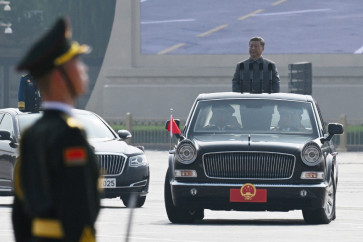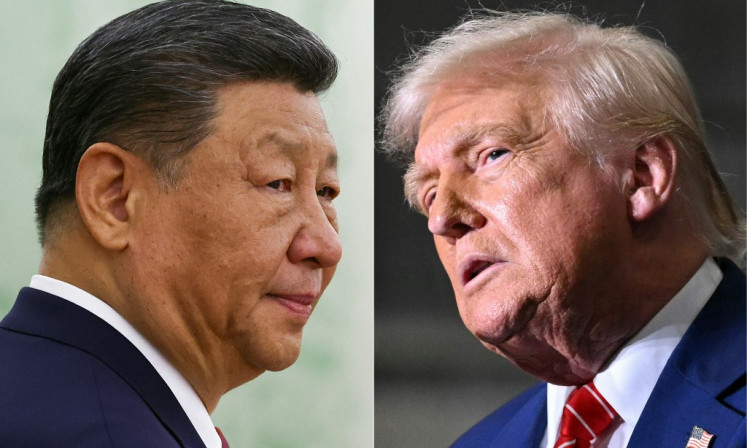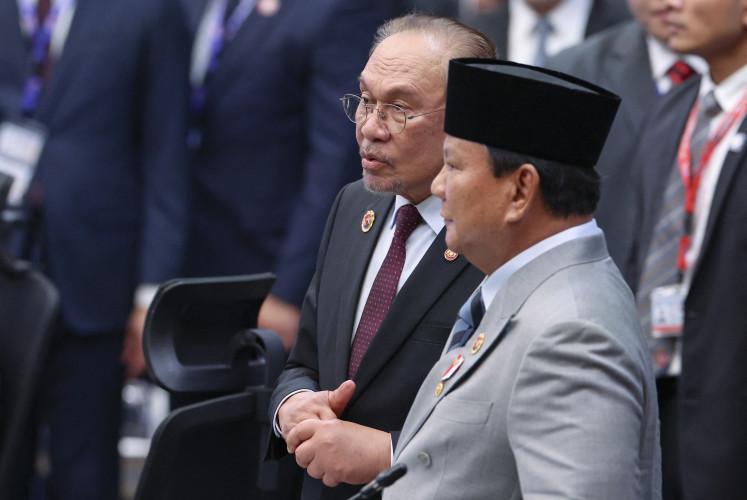Popular Reads
Top Results
Can't find what you're looking for?
View all search resultsPopular Reads
Top Results
Can't find what you're looking for?
View all search resultsRI factories must adopt AI or lose out, says IBM
Indonesia’s manufacturing sector is at risk of losing out to competitors in other countries if it doesn’t keep up with AI, says IBM chairman and CEO Arvind Krishna.
Change text size
Gift Premium Articles
to Anyone
I
BM made its mark in the artificial intelligence (AI) boom in May, when it introduced Watson X, an enterprise-ready platform that helps businesses build, deploy and govern AI applications.
IMB chairman and CEO Arvind Krishna visited Jakarta for a three-day trip last month to meet clients and government officials in a country where IBM sees a lot of demand for AI solutions.
He sat down with The Jakarta Post’s Mark Lempp and Ruth Dea Juwita on Aug. 22 to discuss the company’s business in the country, digitalization and strategies for the responsible use of AI amid concerns over job losses and privacy.
Question: What is the market penetration for the software business in Indonesia?
Answer: I think Indonesia is booming. I’ll call it a natural progression. As economies become a bit more advanced and as companies become more global, and there’s a scale and Indonesia has definitely passed that tipping point at scale, technology begins to grow from half a percent to 4, 5 percent of GDP.
Enterprise technology is largely manifested through software. Combining technology with the underlying GDP growth [gives] you substantial growth in enterprise technology. We see the demand, and that's one of the reasons we are here.
What are your main revenue streams in Indonesia? Which industries do you cater to mostly?
There are three big ones we cater to today: financial sector, telecom sector and government. We want to invest more in the country, and that’s what we are doing today. So our revenue streams are mostly coming through our mainframe systems – that’s our infrastructure and hardware – and it comes through our software.
IBM as a whole has transformed. IBM used to be 70 percent hardware in 1990. We are about 12 percent hardware today. In a few years, we have 50 percent software globally. I expect that to be in the ratio here [in Indonesia] also.
How far along is Indonesia in its push to digitalize the economy?
The digitalization of the economy is driving growth in digital payments and creating a need for more digitally skilled workers.
I’ve seen it within our banking clients. Within the last three years, their transaction volume has gone up four times, while the clients numbers grew only grew by 20 to 30 percent. This means there's an underlying trend of digitization, where digital payments, especially person-to-person payment, are taking a larger share.
At the same time, there’s a government-led drive to enhance training [and] encourage people to get trained on digital technologies. We were earlier with a couple of different ministers, and one of them talked how they see a gap to 2035, that the country needs 9 million more digitally trained people than exist today.
I don't look at that as a negative. That means the government understands the need to push digitization forward.
Does AI specifically help to push digitalization forward?
Digitization is what allows companies and governments to scale the services they provide without pulling in a huge complexity of human-based cost.
With AI, digitalization can reduce the cost of providing a service by 100 times, helping to achieve the GDP growth goal and improve the economic quality of life.
Is there cause for caution as well in this?
I believe that there's an onus on AI providers to provide guardrails, to proactively monitor and prevent any instances of misuse. But it’s hard to control it.
Like any other technology, AI can be misused. But in an enterprise context, AI is used with curated data and guardrails to prevent bias and ethics violations.
AI providers should be accountable for what AI does, including the copyright law, bias and ethics. [We at] IBM are willing to be held accountable for the technology we provide.
What about the fear of AI replacing the workforce in a big way?
I actually do not worry about that at all. I think we underestimate how much capacity there is to absorb work, because of all the needs for the workforce.
For instance, consider the shift in the United States. In 1900, 47 percent of the people were directly working on farms. Today, that’s 3 percent. Yet, we do not have 44 percent unemployment, we only have three and a half percent unemployment. So, what happened? Where did all that workforce get absorbed?
As technology displaces roles, the opportunities will evolve. As people have more time, a shift in the workplace is going to happen, even in health care and education.
What about the skills mismatch in the country with this advancement?
During the G20 meeting, there was term that has emerged: the Global South, [which] should be an equal participant. I don't love the term [Global South], but I accept it. Our mission is to prevent any nation from being left behind in digitization and the deployment of these technologies. For this, technology must be affordable and cost practical, even in economies with limited resources.
I believe there’s a potential here, with people possessing basic math and physics skills that can be honed to deploy AI with just a few months of training. We just need people’s willingness to learn and the presence of a market where these newly acquired skills can be put into action.
How can AI help Indonesia’s manufacturing sector, where it is not yet used a lot?
I could not speak to manufacturing in Indonesia, but globally, manufacturing is looking to do more AI-driven automation, more so than five years ago.
The pandemic highlighted the challenges of dense factory floors, leading to a shift toward using AI automation, even for quality control as well. Visual inspection of parts with AI-driven cameras throughout different stages of production has become a game changer, improving quality significantly.
Indonesia’s manufacturing sector is at risk of losing out if it doesn’t keep up with AI.










